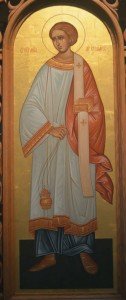 In the feast of the Nativity we admired the infinite love and sacrifice of God for us. On the third day after the feast, the Church places before us the heroic example of the love of God in the person of the Protomartyr Stephen. St. Gregory of Nyssa says:
In the feast of the Nativity we admired the infinite love and sacrifice of God for us. On the third day after the feast, the Church places before us the heroic example of the love of God in the person of the Protomartyr Stephen. St. Gregory of Nyssa says:
Behold we go from one feast to another and receive grace upon grace. Yesterday the Lord the universe filled us with wonder, whereas today the disciple of the Lord fills us with wonder. In what manner the former, and in what manner the latter? The former, for our sakes assumed human nature, while the latter for the sake of the Lord rid himself of human nature. The martyr’s death of Stephen is truly singular, as is his cult, which is enjoyed in the Church of Christ since apostolic times.
The Eastern Church gives Stephen a title that is threefold: Apostle, Protomartyr and Archdeacon. Stephen belonged to the 70 apostles whose memory our Church honors on the 4th of January. For his holiness, fortitude and zeal in spreading the word of God, he deserves the title of apostle in every way. The Acts of the Apostles say that he was “a man full of faith and of the Holy Spirit”.
Stephen was not only a zealous apostle, but was also the first martyr. Accused before the Sanhedrin by false witnesses, he bravely professed the holy faith. For this they led him out of the city and stoned him to death. This occurred in the year 34 or 35 CE. Like Christ, he too prayed for his enemies at his death. Saul, a young Rabbi who later became the Apostle Paul, took part in his martyrdom. As a result of this heroic act, Stephen has received the title of Protomartyr or First Martyr. The Holy Fathers highly extol this title in their sermons and it is emphasized, in a special way, by our Church.
Our Church has an additional feast in his honor on August 2nd when it remembers the translation of his relics to Constantinople in the year 560 CE.
He is given the title of Archdeacon because he was first among the seven deacons chosen to take care of the poor.
Originally his feast was celebrated on the second day after Christmas. When, however, the Eastern Church instituted the Synaxis of the Mother of God somewhere in the seventh century, his feast was transferred to the third day after Christmas.
The feast of Stephen was already generally known in the fourth century and was celebrated on an equal footing with those of the Apostles. His relics were first found in 415 CE. There are many and different legends that surround this First Martyr.
